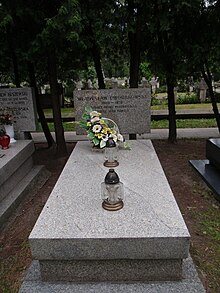Wladyslaw Dworakowski
Władysław Dworakowski (born September 10, 1908 in Oblasy, Gmina Janowiec ; † November 17, 1976 in Warsaw ) was a politician of the Polish United Workers' Party PZPR ( Polska Zjednoczona Partia Robotnicza ) in the People's Republic of Poland , who was among other things vice-president of the Council of Ministers and from 1954 to 1956 Chairman of the Public Security Committee .
Life
Władysław Dworakowski, who was a locksmith by profession, joined in 1934 as a member of the then Communist Party of Poland KPP (Komunistyczna Partia Polski) and in 1942 the Polish Workers' Party PPR ( Polska Partia Robotnicza ) . On December 31, 1943, he became a member of the National Council of the KRN ( Krajowa Rada Narodowa ) for the PPR , of which he was a member until 1947. During this time he was secretary of the Committee on Religion and Nationalities. After the end of the Second World War he became a party functionary of the PPR. In the Sejm election on January 19, 1947 he was elected for the PPR in constituency No. 24 Gdynia as a member of the Constituent Sejm (Sejm Ustawodawczy) . During this time he was from 1947 to 1952 both Vice-Chairman of the Committee on Shipping and Foreign Trade and a member of the Presidium of the PPR Group . He was also a member of numerous other parliamentary committees. In 1948 he became a member of the Polish United Workers' Party PZPR ( Polska Zjednoczona Partia Robotnicza ) and served as First Secretary of the PZPR Committee of the Łódź Voivodeship between 1949 and 1950 . In 1950 he was dismissed from this post to work for the Central Committee of the Polish United Workers' Party (Central Committee of the PZPR).
Dworakowski was a candidate for the Politburo of the Central Committee of the PZPR between 1952 and 1954. On November 20, 1952, he was elected a member of the Sejm for the PZPR and represented constituency no. 8 Łódź in this until November 20, 1956 . He acted between November 21, 1952 and March 18, 1954 as Vice President of the Council of Ministers and thus as Deputy Prime Minister (Wicepremier) in the government of Prime Minister Bolesław Bierut . At the Second Party Congress (March 10 to 17, 1954) he became a member of the Politburo of the Central Committee and at the same time Secretary of the Central Committee of the PZPR. Furthermore, on December 7, 1954, he succeeded the previous Minister of Public Security Stanisław Radkiewicz as Chairman of the Public Security Committee at the Council of Ministers (Przewodniczący Komitetu do spraw Bezpieczeństwa Publicznego przy Radzie Ministrów) and held this post until March 29, 1956, whereupon Edmund Pszczółkowski succeeded him. During this time he was in the power struggle within the PZPR next Franciszek Jóźwiak , Viktor Klosiewicz , Zenon Nowak , Aleksander Zawadzki , Władysław Kruczek , Hilary Chełchowski , Kazimierz Mijal , Franciszek Mazur , Bolesław Ruminski and Stanisław Lapot the influential Natolin- faction on. For his services he received, among other things, the Order of the Banner of Labor (Order Sztandaru Pracy) First Class and the Medal for Warsaw 1939–1945 (Medal za Warszawę 1939–1945) .
On October 21, 1956, Władysław Dworakowski finally lost his functions as a member of the Politburo of the Central Committee and Secretary of the Central Committee of the PZPR after Władysław Gomułka was elected First Secretary of the Central Committee in the course of October in Poland . Five years earlier, Dworakowski was involved in Gomułka's arrest and expulsion from the PZPR in 1951. In particular, Dworakowski had criticized the work of Gomułka as Minister for the " regained areas ", that is, the former German eastern territories . In 1951 Dworakowski expressed the condemnation of Gomułka's “polonization policy”, which disregarded communist doctrine, as follows: “Full of hatred for the Soviet Union, Gomułka led an action through which our working masses were to be won over to the bourgeoisie and the big landowners.” Later stepped Dworakowski joined the Communist Party of Poland, KPP (Komunistyczna Partia Polski) founded in 1965 by the Maoist Kazimierz Mijal . After his death he was buried in the Powązki cemetery in Warsaw .
Web links
- Entry on the Sejm's homepage
- The Governments of People's Republic of Poland 1944–1989
- The Politburo of the PZPR
Individual evidence
- ^ Poland: Deputy Prime Ministers in Rulers
- ↑ POLAND / OR NEISSE BORDER: The great taboo . In: Spiegel Online from November 22, 1961
| personal data | |
|---|---|
| SURNAME | Dworakowski, Wladyslaw |
| BRIEF DESCRIPTION | Polish politician, member of the Sejm (PZPR) and minister |
| DATE OF BIRTH | September 10, 1908 |
| PLACE OF BIRTH | Oblasy, Gmina Janowiec |
| DATE OF DEATH | 17th November 1976 |
| Place of death | Warsaw |
